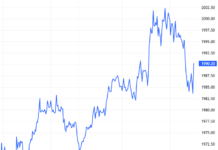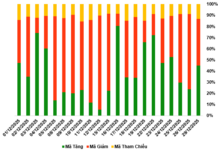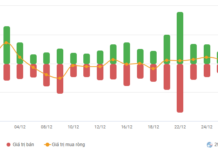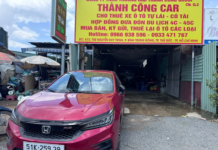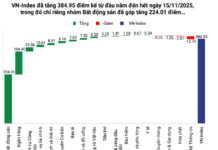On September 25th, the Party Committee of the Ho Chi Minh City People’s Committee (HCMC PC) held a conference to study and implement the resolution and action plan for the Resolution of the 1st Congress of the HCMC PC Party Committee for the 2025-2030 term.
At the conference, Mr. Nguyen Van Duoc, Secretary of the HCMC PC Party Committee and Chairman of the HCMC People’s Committee, outlined key tasks to concretize and bring the Resolution to life.
Proposing Effective and Innovative Approaches
Mr. Duoc emphasized that the Resolution serves as the guiding principle for HCMC’s development over the next five years, representing the collective wisdom of the entire political system, citizens, and businesses, encompassing all aspects of life.

Mr. Nguyen Van Duoc, Secretary of the Party Committee and Chairman of the HCMC People’s Committee, addressing the conference. Photo: HA THU |
“A resolution, no matter how well-crafted, remains just a resolution if it doesn’t translate into action,” Mr. Duoc stated.
According to Mr. Nguyen Van Duoc, HCMC’s vision by 2030 is to become a civilized, modern city, a hub for innovation, dynamism, and integration, leading the nation’s industrialization and modernization efforts. It aims to be a prominent city in Southeast Asia, ranking among the top 100 global cities, offering a high quality of life and a world-class innovation ecosystem, with a high-income status.
By 2045, HCMC envisions itself among the world’s best cities, a worthy international metropolis in Southeast Asia, serving as a center for economics, finance, tourism, services, education, and healthcare in Asia. It aims to be a globally attractive destination with distinctive and sustainable socio-economic development and a high quality of life, deeply integrated internationally.
He stressed that this vision, entrusted by the Party and the Central Committee to HCMC, carries the expectations of the people. “The task is not easy, and HCMC must be determined and resolute in its implementation, proposing effective and innovative approaches with a ‘hot heart and a cool head.’ No matter the challenges, we will succeed,” he said. He urged all levels and sectors to concretize the resolution through action plans and specific projects.
Chairman Nguyen Van Duoc announced that HCMC is proposing amendments to Resolution 98/2023, aiming to submit it to the National Assembly in October. This resolution is a key tool to create new momentum for the city’s implementation efforts.
Moving forward, the city will focus on infrastructure development, building a synchronized and modern transportation system to meet the resolution’s goal of ranking HCMC among the top 100 most livable cities globally by 2030.
Mr. Nguyen Van Duoc also mentioned that HCMC will concentrate on developing a new spatial planning scheme for the city post-merger. “This is not a simple addition like 1+1+1 equals 3, but it could be 9, 10, or even 100,” he emphasized.
He continued, “In our mindset, we should never think of ourselves as three separate localities but as one, as HCMC. If we still differentiate, we cannot develop.”
Highlighting the advantages of HCMC, Binh Duong, and Ba Ria – Vung Tau, Mr. Nguyen Van Duoc suggested that each area should play its role in development without overlapping, maximizing the strengths of each region.
The Chairman of HCMC urged all levels and sectors to implement the resolution through specific programs and projects with the spirit of “not postponing until tomorrow what we can do today.” “Whatever can be done, let’s do it, the sooner the better, as life and opportunities do not wait for us,” he added.
Deploying ‘Special Task Forces’ to Wards and Communes
At the conference, Mr. Nguyen Van Duoc highlighted a critical task for the upcoming period: land clearance compensation and the responsibilities of all levels and sectors, particularly wards and communes.
“This is a breakthrough step. Without land clearance, there can be no infrastructure, and without infrastructure, development is impossible,” Mr. Duoc emphasized.
Mr. Nguyen Van Duoc pointed out that currently, commune-level authorities face many challenges in implementation, with some lacking staff, especially specialized personnel. Some officials even hesitate to make decisions, leading to delays in land clearance for projects.
“HCMC will second officials from departments and agencies to communes and wards to coordinate and directly oversee each project, helping commune-level authorities understand and act confidently,” he informed.
Specifically, Mr. Nguyen Van Duoc announced that officials will be assigned to key localities with major projects such as Ring Road 3, Ring Road 4, gateway transportation routes like National Highway 13, National Highway 22, National Highway 1, the extended Vo Van Kiet Road, the extended Nguyen Van Linh Road, internal projects, and housing renovation plans along canals…
 Chairman of the HCMC People’s Committee Nguyen Van Duoc engaging with conference delegates. Photo: HA THU |
Chairman Nguyen Van Duoc requested Director of the Department of Natural Resources and Environment Nguyen Toan Thang to establish “special task forces” to support land clearance efforts in key wards and communes.
“HCMC’s public investment disbursement has improved compared to before but is not yet sustainable. Some wards and communes are still hesitant, and many officials dare not make decisions. To address this, I propose that special task forces go directly to wards and communes, guiding them step by step to help them act boldly,” he tasked.

Mr. Nguyen Toan Thang, Director of the Department of Natural Resources and Environment, implementing coordination efforts between the department and localities in land clearance. Photo: HA THU
|
Mr. Duoc also emphasized that the secretaries and chairpersons of 168 wards, communes, and special zones must vigorously pursue land clearance, as this is a criterion for evaluating the effectiveness of party committees and leaders at all levels. If any ward or commune fails to effectively clear land, causing project delays, their leaders will be held accountable.
Mr. Nguyen Van Duoc urged local leaders to be resolute in implementing policies for local development. They must dare to make decisions, whether “right” or “wrong,” but as long as their intentions are sincere and for the common good, the HCMC leadership will support and protect them.
“This is also a lesson for us to grow and dare to act. Departments and HCMC leaders will stand by, support, and guide you, as long as you have a heart for your locality and the city, to boldly pursue development goals,” said Chairman of the HCMC People’s Committee Nguyen Van Duoc.
|
Bringing the Resolution to Life Recognizing the significant tasks ahead, Mr. Nguyen Van Duoc, Secretary of the Party Committee and Chairman of the HCMC People’s Committee, expressed strong confidence in the intelligence and determination of the city’s cadre and civil servants, driven by a spirit of innovation and the collective strength of the entire Party Committee. This will create a powerful momentum to achieve the city’s strategic goals. “I call on the entire Party Committee, every agency, unit, and individual, to take specific actions each day, achieving concrete results with persistence and resilience… Let the spirit of the Resolution permeate every level, sector, and official, thereby bringing the Resolution to life, fostering trust and driving development. Together, we will propel the city’s rapid and sustainable growth, contributing to the nation’s new era of development,” Mr. Nguyen Van Duoc appealed. |
BAO PHUONG
– 13:31 25/09/2025
Latest Developments in Central Vietnam’s Largest Real Estate Scandal
The Vice Chairman of Da Nang City inspected three projects by Bach Dat An, aiming to accelerate progress and safeguard the legal rights of land buyers.
Unveiling the Secrets Behind $100 Million per Square Meter Condo Prices
The current prices of condominiums have skyrocketed beyond the reach of not only low-income earners but also those in the upper-middle-income bracket. This staggering reality stems from developers grappling with exorbitant costs: soaring interest payments on loans, escalating soft costs, prolonged legal procedures for project approvals, hefty land-use fees, surging construction material prices, and debt moratorium policies.
Satellite City Real Estate Prices 40-50% Lower Than Central Urban Areas
Mr. Nguyen Khanh Duy, Director of Residential Sales at Savills Vietnam, asserts that property prices in satellite urban areas of Ho Chi Minh City are currently 40-50% lower than those in the city center.

